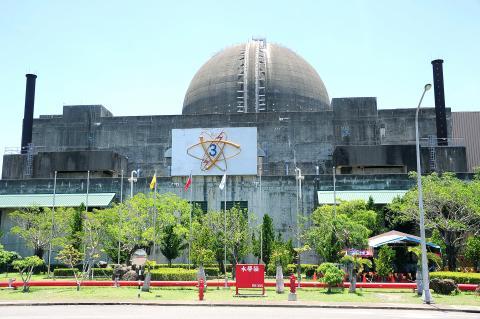To combat global warming and greenhouse gas emissions, developing renewable energy is the only way to reduce the exploitation of fossil fuel and phase out nuclear energy, visiting Potsdam Institute for Climate Impact Research director Hans Schellnhuber said that.
Schellnhuber, a joint recipient of the 2007 Nobel Peace Prize along with former US vice president Al Gore, made the remarks in two speeches in Taipei, on Thursday and yesterday.
During a symposium titled “Humanity at the Crossroads” in Taipei on Thursday, Schellnhuber said: “The debate of whether global warming is manmade is over. The question is what we do about it.”
The German researcher proposed the target of limiting global warming to no more than 2°C in 1995, which has been adopted by the German government and the EU and later as a target by governments worldwide.
However, he said that a majority of coral reefs would be lost if global temperatures rise by 1.5°C, which would also cause a slowdown in thermohaline circulation.
“If we burned all the fossil fuels of the planet, all the ice-sheets on the Atlantic Ocean would be melted, and sea levels would rise by 50m,” he said.
Comparing Taiwan with Germany, he said that both countries had depended on coal-fired energy to develop their heavy industry and electronics industry.
The development took its toll in Germany, producing smog and creating a retreating forest line in the Rhine-Ruhr area, after which the country was determined to transition to renewable energy, he said.
Germany aims to cut emissions by 40 percent by 2020 compared with 1990 levels, and phase out nuclear energy by 2022 after the Fukushima Dai-ichi nuclear disaster in 2011, he said, adding that Germany could serve as an example for Taiwan for how to successfully transition from coal-fired energy to renewable energy.
Schellnhuber added that although Germany’s carbon emissions rose when the nation started to decommission its nuclear power plants, the emissions later decreased when a renewable energy power grid was developed, and now the county’s power industry has a 50 percent oversupply.
That nuclear energy could guarantee the energy security is a misconception, and all we need is time to transition from nuclear and coal-fired energy to renewable energy, he said. Meanwhile, the Executive Yuan put forward an intended nationally determined contribution (INDC) on Thursday, specifying that Taiwan would reduce its greenhouse gas emissions by 50 percent by 2030.
Environmental Protection Administration (EPA) Minister Wei Kuo-yen (魏國彥) said the INDC was based on the scenario that three of the nation’s active nuclear plants would be decommissioned and the now-mothballed nuclear power plant be activated.
Separately, in a talk with Wei at the EPA headquarters in Taipei yesterday, Schellnhuber said it is very encouraging that Taiwan voluntarily proposed the INDC and the Greenhouse Gas Reduction Act (溫室氣體減量法) in June, adding that Taiwan is taking the global responsibility unilaterally, given that the county is not an official member of the UN or the Intergovernmental Panel on Climate Change.
However, Taiwan could make a difference by setting an example in the region and influencing China, which accounts for 23 percent of global carbon emissions, he said.
To reach the INDC goal, Taiwan could replace gas-powered scooters with electric models, develop offshore wind power and replace concrete with natural building materials, he said.

A fugitive in a suspected cosmetic surgery fraud case today returned to Taiwan from Canada, after being wanted for six years. Internet celebrity Su Chen-tuan (蘇陳端), known as Lady Nai Nai (貴婦奈奈), and her former boyfriend, plastic surgeon Paul Huang (黃博健), allegedly defrauded clients and friends of about NT$1 billion (US$30.66 million). Su was put on a wanted list in 2019 when she lived in Toronto, Canada, after failing to respond to subpoenas and arrest warrants from the Taipei District Prosecutors’ Office. Su arrived at Taiwan Taoyuan International Airport at 5am today on an EVA Air flight accompanied by a

An essay competition jointly organized by a local writing society and a publisher affiliated with the Chinese Communist Party (CCP) might have contravened the Act Governing Relations Between the People of the Taiwan Area and the Mainland Area (臺灣地區與大陸地區人民關係條例), the Mainland Affairs Council (MAC) said on Thursday. “In this case, the partner organization is clearly an agency under the CCP’s Fujian Provincial Committee,” MAC Deputy Minister and spokesperson Liang Wen-chieh (梁文傑) said at a news briefing in Taipei. “It also involves bringing Taiwanese students to China with all-expenses-paid arrangements to attend award ceremonies and camps,” Liang said. Those two “characteristics” are typically sufficient

A magnitude 5.9 earthquake that struck about 33km off the coast of Hualien City was the "main shock" in a series of quakes in the area, with aftershocks expected over the next three days, the Central Weather Administration (CWA) said yesterday. Prior to the magnitude 5.9 quake shaking most of Taiwan at 6:53pm yesterday, six other earthquakes stronger than a magnitude of 4, starting with a magnitude 5.5 quake at 6:09pm, occurred in the area. CWA Seismological Center Director Wu Chien-fu (吳健富) confirmed that the quakes were all part of the same series and that the magnitude 5.5 temblor was

Restarting the No. 2 reactor at the Ma-anshan Nuclear Power Plant would take up to 18 months, Minister of Economic Affairs J.W. Kuo (郭智輝) said today. Kuo was answering questions during a meeting of the Legislative Yuan’s Economics Committee, where legislators are considering amendments to the Renewable Energy Development Act (再生能源發展條) amid concerns about the consequences of the Pingtung County reactor’s decommissioning scheduled for May 17. Its decommissioning is to mark the end of Taiwan’s nuclear power production. However, Chinese Nationalist Party (KMT) lawmakers have proposed an amendment to the Nuclear Reactor Facilities Regulation Act (核子反應器設施管制法) that would extend the life of existing